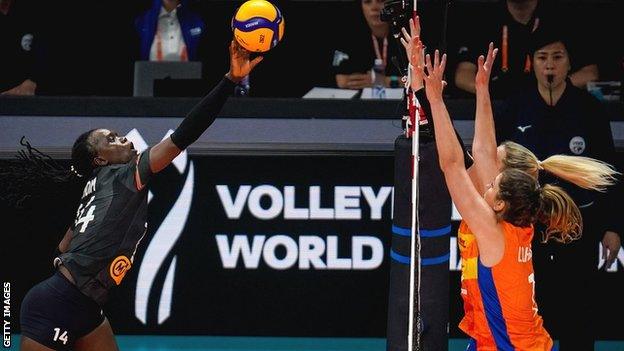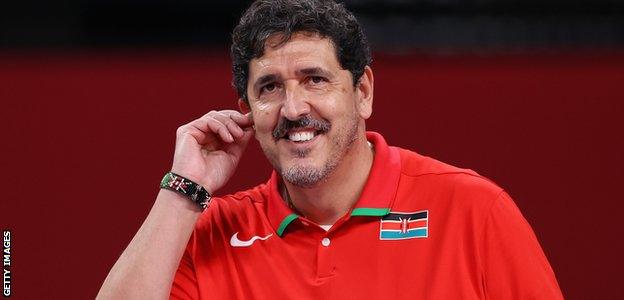Progressive Kenya lead the way in volleyball pilot scheme
- Published

Kenya lost 12 of the 16 sets they played at this year's Women's World Championship, with their sole win coming against Cameroon
The head of volleyball's world governing body, the FIVB, says a project to develop Kenya's national teams is a blueprint for the sport across the world.
Kenya was the first beneficiary of the 'Volleyball Empowerment' scheme, with the model having since been spread out further across Africa and beyond.
FIVB general director Fabio Azevedo says that a new commercial deal with private equity company CVC Capital Partners will allow millions of dollars to be spent on training and facilities to develop the game.
"We are using this money, that comes through the sport, to be invested back into the sport," Azevedo told BBC Sport Africa.
At the recently concluded Women's World Championship, Kenya narrowly missed out on qualifying for the second phase for the first time, with Azevedo saying the support the team has received in the past year or so has been crucial to its development.
"Kenya was the pilot project - we saw that they had qualified for the 2020 Tokyo Olympics, [but] with outdoor training facilities, equipment or core personnel," he said.
"We put in place a project. We helped train the girls for 75 days before the Olympics Games.
"We kept going and then they came to the World Champs. So I believe it is 'mission accomplished'."
Kenya won a match at the World Championship for the first time this year, in a tournament co-hosted in the Netherlands and Poland, after beating fellow African contenders Cameroon, who were also clear that their participation was all about development.
Kenya's coach at the tournament, which was won by defending champions Serbia, was Brazilian Luizomar de Moura, who has coached some of the best teams in his own country and won the club world title.
His position in Kenya, and that of support staff, was funded directly by FIVB - something the governing body is keen to do elsewhere.
Global growth

Brazilian coach Luizomar de Moura led Kenya to their first ever win at the World Championship in September
The deal with CVC was sealed at the beginning of last year but the Volleyball Empowerment scheme is already being expanded.
The FIVB's website has information relating to all the projects, external now being funded, ranging from a few thousand dollars for new balls to millions in support of coaching programmes and venue development.
External auditors make sure the cash is spent in the right way, the organisation says.
African countries which have benefited in recent months include Angola, Libya, Mozambique, Nigeria, South Africa and The Gambia, and Azevedo says there are now some 500 projects running around the world.
"The concept works," added Azevedo.
In four years' time, the hope is that more African countries will be looking at the chance to qualify for the next World Championship.
The format is being expanded, from 24 teams to 32, in both the men's and women's game, and, whilst it is not yet certain how qualifying places will be distributed, it is likely Africa will get more than two spots at the next global showpiece.
Mercy Moim, who has been on the Kenyan team for more than a decade and is now captain, said the scheme will take time to really make an impact.
"We have 90% young players [in the squad] - maybe after two to three years we're going to be the best," she told BBC Sport Africa.
"It's a project, [but] I know it's a good initiative."
While the focus is on national teams for now, the FIVB ultimately hopes that its scheme can help bring more people into the game - both as fans and as participants.